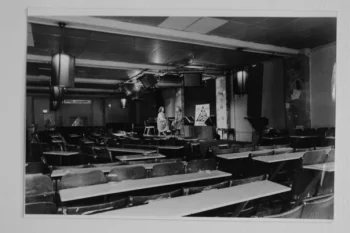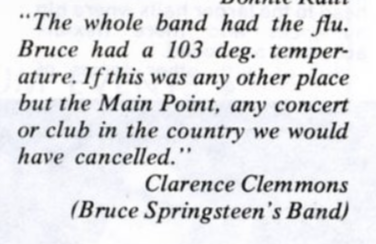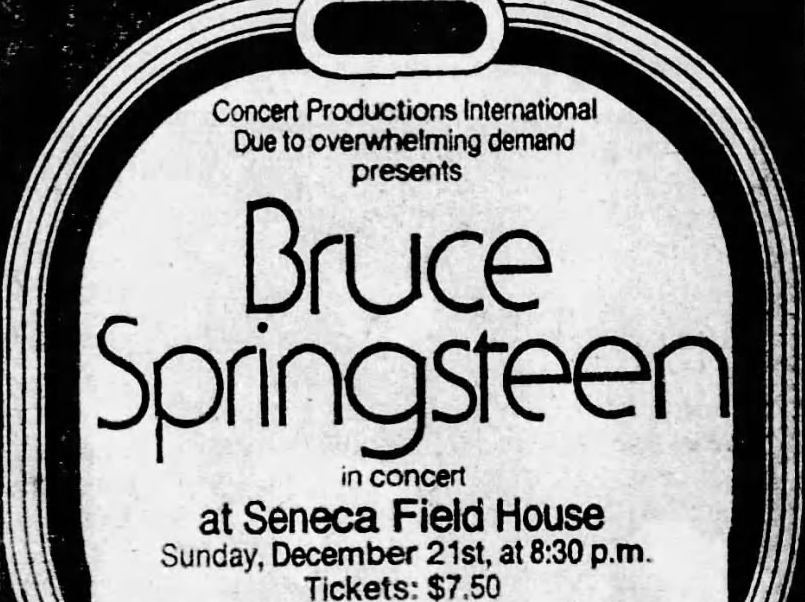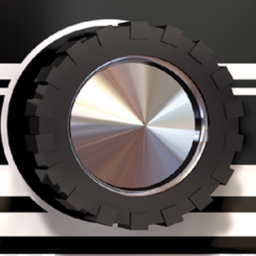Bruce Springsteen & the E Street Band, The Main Point, Bryn Mawr, PA, February 5, 1975
Let’s welcome home to the Main Point, and to WMMR, one more time: Bruce Springsteen and the E Street Band.

Setlist: INCIDENT ON 57TH STREET / MOUNTAIN OF LOVE / BORN TO RUN / THE E STREET SHUFFLE / WINGS FOR WHEELS / I WANT YOU / SPIRIT IN THE NIGHT / SHE'S THE ONE / GROWIN' UP / IT'S HARD TO BE A SAINT IN THE CITY / JUNGLELAND / KITTY'S BACK / NEW YORK CITY SERENADE / ROSALITA (COME OUT TONIGHT) / 4TH OF JULY, ASBURY PARK (SANDY) / A LOVE SO FINE / FOR YOU / BACK IN THE U.S.A.
The E Street Band at this moment is Roy Bittan, Clarence Clemons, Danny Federici, Garry Tallent, and Max Weinberg. Suki Lahav appears as a guest musician.
Venue capacity: 200-280, depending on who you ask
Good evening, ladies and gentlemen, welcome to the Main Point. I’m Ed Sciaky from WMMR. And with the help of Mom’s Wholesome Audio, we are very happy to be able to share with people all over the Delaware Valley what is a very special evening. Bruce will do a gig tomorrow night and Friday night at Widener, and they’ll be his last two performances in Philadelphia for a few months as he goes off to conquer America and the world. Tonight’s a special farewell to the Main Point from Bruce, as a benefit for the Main Point. Let’s welcome home to the Main Point, and to WMMR, one more time: Bruce Springsteen and the E Street Band.
The audience’s applause is loud, much louder than the actual capacity of the Main Point – between 200-270 depending on who you ask – would suggest. Then you hear a few tentative violin notes and the entire place goes instantly dead silent. A few more stray notes, a piano chord or two, and then the song formally begins.
“Incident”’s opening is a construct, there’s a prelude where you hear the faint echo of a unreleased song known as “Wings for Wheels” (that we’ll hear later in the set) before the slightest of pauses and a transition into the song’s circular opening motif. The crowd recognizes it and applauds lightly, like there was a collective agreement to not make too much noise and disturb the magic.

Then the violin, pure and high and lonesome, crystalline pathos that is instantly, immediately riveting. It’s novel but it’s not in opposition to the song’s essential nature so it just feels special. For listeners out in radioland, you’d only know there was a violin in the E Street Band if you’d seen them live since October. The violin belongs to Suki Lahav, the wife of recording engineer Louis Lahav, who’s been working with Bruce and manager/producer Mike Appel on getting the songs down for Springsteen’s third album. (Of course, it’s much more complicated than that simple statement sounds, but we’ll get to all that later.) Bruce had been looking for a violin – it was one of the asks in the Village Voice ad that produced newcomers Bittan and Max Weinberg, both of whom only came on board about six months ago – and after not finding anyone else he liked, Suki began performing with the band (but was never actually a member) in October of 1974.
And then: Spanish Johnny drove in from the underworld last night.
It’s just Bruce and Roy right now. Bruce’s vocals are just the tiniest bit conversational, but he’s not talk-singing, he’s absolutely singing, but there is an extra degree of tension in his delivery tonight, there’s a rawness that immediately calls you to attention if you somehow weren’t already. Even the shittiest version of this tape always felt so open and direct, he sounds so close to you.
And from out of the shadows came a young girl's voice - Bruce adds, in a whisper: “Johnny!” before going back into the verse.
Said, "Johnny, don't cry"
And Johnny sighed, Puerto Rican Jane
The violin is back, the countermelody underneath the vocals until the end of the verse. The piano is background, it’s impossible to compete with the exquisite tension of the violin and the manner in which it is almost another character in the song because of its emotional dominance. It stabs you right in the heart.
Upstairs a band was playing, the singer was singing something about going home
Bruce has never sung that line better, with more depth, with more longing.
In the last verse, singing about Spanish Johnny and Janey’s conversation, Suki’s voice comes in, echoing the “those romantic young boys” line. The clarity of her soprano is astonishing but what she’s doing here is bringing Janey’s actual voice into the song without making it into a duet, which would feel more like a musical than a rock ballad, it would be hokey, whereas this is just flat out gorgeous.
The violin comes back at the beginning of the last chorus and the piano comes back in with more prominence, both of them underscoring Bruce’s wordless vocalization that’s just helping the song move along.
Then the two of them, Suki and Roy, continue the duet into the closing motif of the song, and instead of it tumbling straight into “Rosalita,” it concludes with the layering over of a recording of a police siren, a device that he’d begun using the previous year. In the days before we knew everything and had tapes of everything so easily available, the debate was always whether or not that was an actual police car that just happened to be driving by but it was always so obvious that it wasn’t, it was a way to punctuate the song and give it the definitive end within a live context.
There is so much pent up enthusiasm and excitement in the applause at song’s end. It’s tangible.
Part of the magic of the Main Point show is the venue itself. The Main Point was a coffee house in Bryn Mawr, PA, 15 miles northwest of Philadelphia. The venture was a homegrown affair, founded in 1964 because the owner(s) wanted a better venue to watch folk music. It didn’t have a liquor license and served things like “hot honey lemonade” and gingerbread cake with whipped cream. The seating looked a lot like old-timey school desks (and may well have been). The venue single-handedly launched the career of Bonnie Raitt and many 70’s folk musicians speak fondly of it. Warren Zevon loved it so much that he changed the lyrics of “Werewolves of London” one time to “Werewolves of Bryn Mawr.” Bruce Springsteen played 45 shows (some of which were early/late show combos on the same night). They clearly loved playing there.


Inside of the Main Point | Quote from a 1974 tribute zine about the Main Point
The late Jeanette Campbell, sole owner of the Main Point by the time of the ‘75 show, wasn’t a fan of rock and roll music but she understood that she needed to book those kinds of bands in order to keep the joint going. It was a venue that cared about music and musicians and music fans and it was rewarded by a fierce loyalty from the people that worked there, played there, and attended shows there. It was a warm-sounding venue which clearly made it a dream to do a live remote recording from. But it wasn’t a highly profitable venture, which is why Bruce is playing a benefit for them tonight.

But the other major non-performance aspect of this show that makes it so memorable is the audible (or rather, non-audible) respect from the audience. Unlike the December '75 show in Toronto , the audience here isn’t quiet because they don’t know the show because they’ve never seen him before. The audience at the Main Point is quiet precisely because they have.







